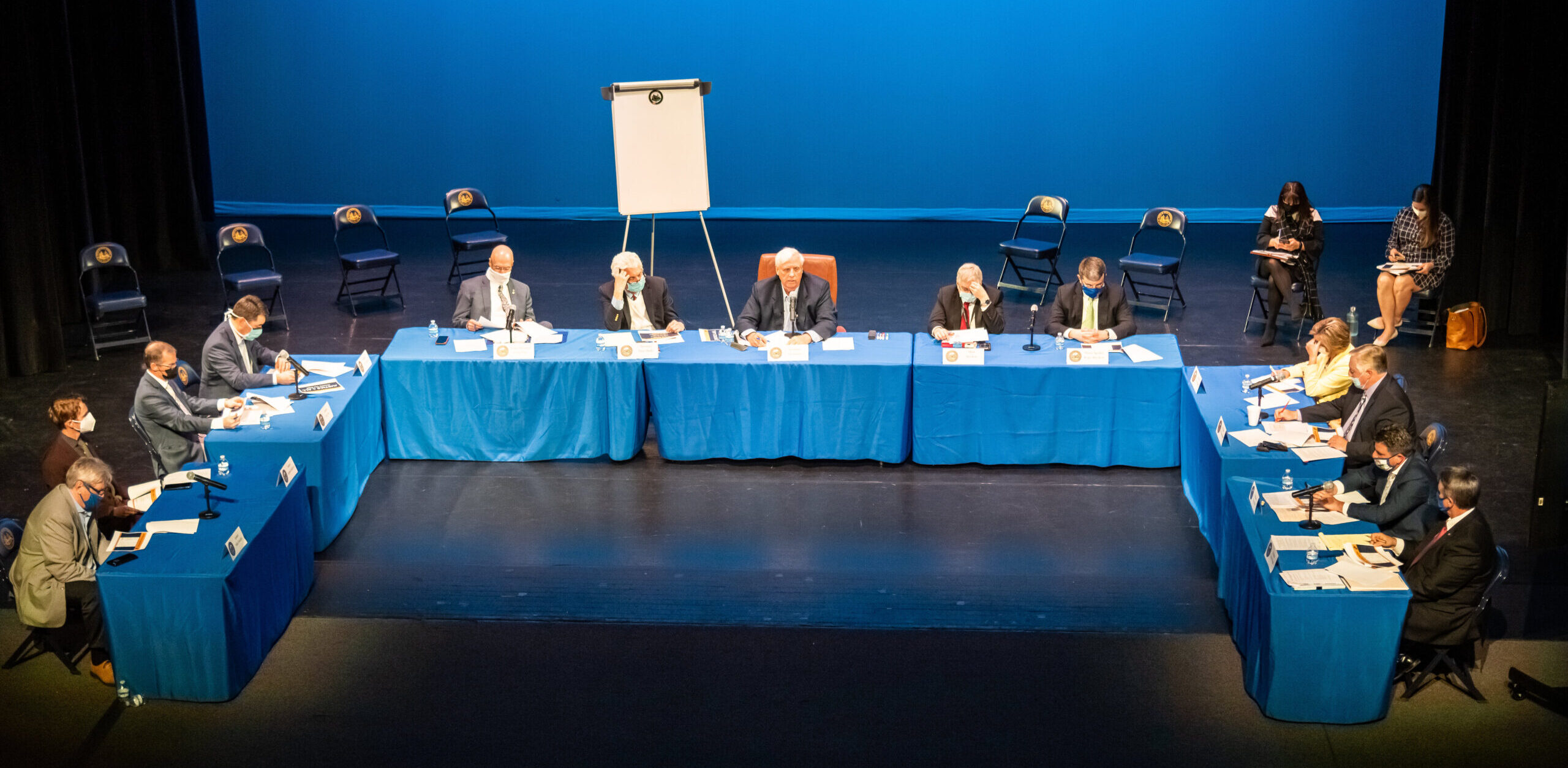MORGANTOWN – With five days to go in the legislative session, Gov. Jim Justice held a personal income tax repeal summit with legislative leaders Monday, and unveiled a revised plan he called Justice 4 All.
As with his original plan, it has more in common with the Senate’s, and the House remained committed to its substantially different vision.
Justice sad his revised plan resulted from input at his town halls across the state. Justice 4 All lowers the initial personal income tax cut from 60% to 50% but adds a 33% cut for small businesses and sole proprietorships that his first plan lacked. It keeps the rebates for low-income households.
It keeps the sales tax hike from 6% to 7.9% but reduces the number of professional services to be taxed and eliminates the sales tax on lottery tickets.
To gain support of the extraction industries, it tweaks the tiered severance tax. It keeps the same tax hikes for cigarettes and tobacco but reduces the vape liquid tax from 75 cents per milliliter to 20 cents. All the booze tax hikes are gone. The increase on soft drink taxes is reduced.
Justice’s original plan proposed abut $902.6 million in tax hikes — about $185 million less than the combined tax cuts and rebates. Justice 4 All raises $812.6 million but offers a more optimistic growth and spending projection.
Combining growth, state budget cuts and projected spending of money back in taxpayers’ pockets, Justice 4 All projects a balanced budget. The original plan projected less growth and no spending of the personal income tax windfall and came up $22.45 million short of a balanced budget.
Opening the summit, Justice said the House plan moves too slowly and the Senate plan penalizes the poor with the restoration of a food tax, a higher sales tax and no rebates.
Senate President Craig Blair, R-Berkeley, said a personal income tax repeal could bring another 100,000 people into his county that is already one of the fastest growing in the state. People pay no attention to a sales tax when they’re shopping, and travelers carry a share of the burden, while an income tax falls exclusively on workers.
Consumption taxes are the wave of the future, he said. There’s a huge underground cash economy and consumption taxes are the only way to have them share the burden. “If we can get the votes I’m all in favor of doing this.”
Senate Finance chair Eric Tarr, R-Putnam, expressed concern about Justice 4 All relying on unstable severance taxes and said the Senate plan includes a “bucketing” system that helps smooth out volatile tax years: the SAFER fund that phases down tax rates based on revenue increase triggers.
Also, he said, the soft drink tax is an excise tax that factors into the sales price, so it will make border county retailers less competitive. A sales tax doesn’t play into the advertised price.
Justice responded that voters will line up against the Senate’s higher sales tax – 8.5% – and its plan penalizes low-income households.
House Finance chair Eric Householder, R-Berkeley, said the easiest way out of the three-plan conundrum is its original HB 3300, which phases out the income tax over about 13 years with no offsetting tax hikes. HB 3300, he said, gives tax relief for all income levels, stimulates growth and limits growth in government spending.
Justice repeated his criticism that it doesn’t help low-income households, but added that it takes 13 years and produces ever-growing budget cuts that total $3 billion by 2033. “We won’t even have a state.”
Senate Minority Leader Stephen Baldwin, D-Greenbrier, said his caucus likes the rebates and received what amounted to a commitment from Justice that they are a make-or-break component of whatever plan results.
House Minority Leader Doug Skaff, D-Kanawha, said income tax repeal is a “laudable and lofty goal.” But they didn’t get a bill until Day 41 and now it’s Day 55 of 60. “The timing is all I question.”
For now they should be looking at passing a balanced budget, he said. The repeal plans rely on growth figures that are only projections, not facts. People coming out of a pandemic want certainty and reliability. They should take the summer to do it right.
Justice responded that the window of opportunity is open now and it could close. “There is a giant urgency.” If they get it a little wrong, it’ll be fine, it can be tweaked.
House Speaker Roger Hanshaw, R-Clay, said he has now come on board with income tax repeal as a component of the plan to draw more people to West Virginia. “Between these three plans there’s a path here to get this done.”
Justice said he doesn’t care whose plan it is. “I don’t care one bit about that. All I care about is one thing and that’s all these people out here.”
While stressing the urgency he also said he’d go on another road show – like he did with Roads to Prosperity – to educate people about his plan and wind up support for it. People, including those who oppose all three plans, don’t understand the benefits, he said. “They don’t have one earthly clue.”
He knows, he said, that the lack of votes in the House remains the major obstacle to passing something. “We all need to be big boys and work together.”
Tweet David Beard@dbeardtdp Email dbeard@dominionpost.com




